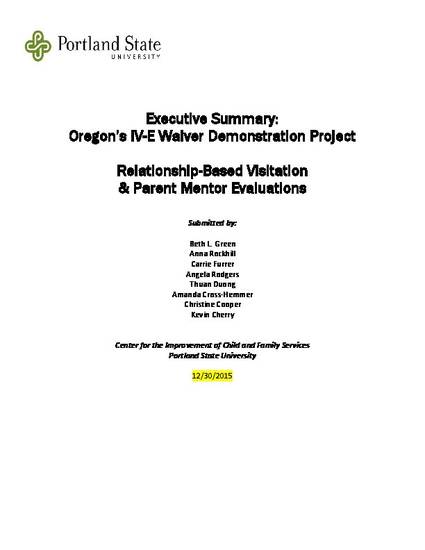
- Social work with youth -- Oregon,
- Mentoring,
- Parents -- Mentoring of,
- Parents -- Services for,
- Family social work,
- Visitation rights (Domestic relations)
The Center for the Improvement of Child and Family Services at Portland State University was contracted by the Oregon Department of Human Services (DHS), Child Welfare Division to conduct the evaluation of the Title IV-E Waiver Demonstration Project. The project was funded by the U.S. Department of Health and Human Services, through the Children’s Bureau. Oregon’s IV-E Waiver Demonstration involved the implementation and evaluation of two innovative service models for families involved in the child welfare system: (1) RelationshipBased Visitation (RBV); and (2) Parent Mentoring (PM). Relationship-Based Visitation (RBV) was provided in 13 Districts and 29 counties; Parent Mentoring was provided in 4 Districts and 7 counties. RBV services were offered to families with children ages 0-12 who were in an out-ofhome placement. The model provided an intensive parent coaching model, based on the evidence-based Nurturing Parenting Program (NPP, Bavolek, McLaughlin, & Comstock, 1983; See also: www.nurturingparenting.com) and was delivered during parent-child visitation by contracted providers. Parent Mentoring employed peer recovery coaches to support parents with substance abuse issues whose children are either receiving in-home or out-of-home services through child welfare. Parent Mentors, who were typically parents who were in their own recovery and who had experience with the child welfare system, utilized a relationship-based, parent-directed, outcome-oriented approach to working with DHS clients to help them sustain their own recovery and successfully retain or regain custody of their children.
Available at: http://works.bepress.com/carrie_furrer/18/

This is the Executive Summary: Oregon’s IV-E Waiver Demonstration Project --Relationship-Based Visitation & Parent Mentor Evaluations.
The Key Findings & Lessons Learned, Relationship Based Visitation Program Overview, Curriculum Info Nurturing Skills for Oregon Families, and Preliminary Results for RBV Providers are included here as supplemental files.